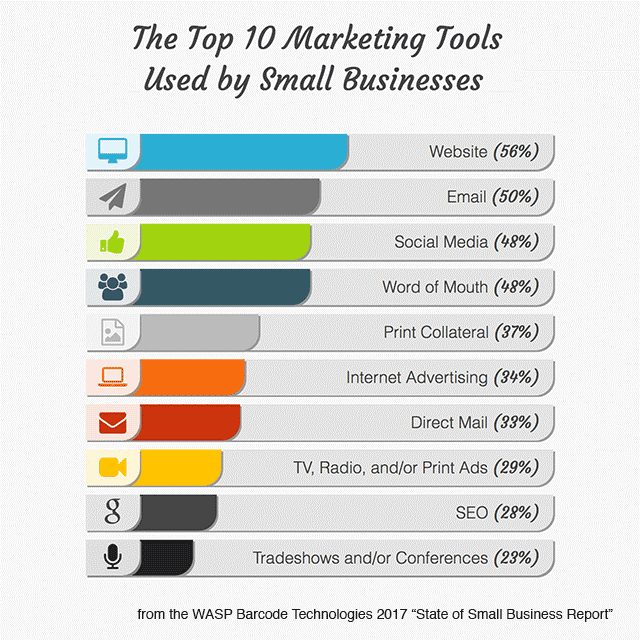Today, we’ll discuss how to market your business to achieve long-term success and growth, since this is the ultimate goal of any business. I’d like to focus on media companies today since they face unique challenges and their business model requires consideration of additional marketing tactics other businesses don’t use. Without further ado, let’s dive right into our topic.

Image courtesy of Kitsap Score
How to market your business: media companies
As you can see from the graphic above, marketing your business involves consideration of multiple marketing strategies and building a marketing plan combining the right strategies is one of the biggest keys to success regardless of your business model or market niche. Learning how to market your business using these strategies and building the detailed action plans required for successful implementation spell the difference between success and failure in the long run. If you’ve never written an action plan, here’s a step-by-step guide on developing an action plan.
Choosing the right strategic elements and marketing tactics depends, to a certain extent on your market niche, although similarities exist across all business models and niches. Whether you run a podcast, online TV show, comedy show, or another type of media company, marketing is crucial to building awareness about what you offer and attracting new viewers or listeners. This aspect of a media business requires similar marketing strategies and tactics as any other business, as they have the goal of increasing awareness in common. For instance, if you’re an influencer, or you want to achieve this status, you must attract a large number of followers for your podcasts, YouTube channel, or TikTok. The more followers you have and the greater engagement you achieve, the greater your financial opportunities.
However, media companies require an additional goal that means additional marketing strategies and tactics, which means they require additional marketing strategies and tactics to meet these goals. Specifically, media companies don’t make money by selling products, unlike most other companies, with few exceptions. A TikTok sensation might sell branded T-shirts, mugs, or other branded products, for instance. More commonly media companies sell advertising and seek sponsorship opportunities from brands as their primary source of revenue. This means they must market to two separate, although related, audiences by building their list of viewers/listeners and reaching out to potential advertisers Learning how to market your business to these two markets requires different strategies.
The media industry
Today, consumers have a plethora of options when it comes to consuming entertainment and media, with younger users opting for non-traditional sources of entertainment, such as podcasts, YouTube, and TikTok rather than commercial TV and radio. TikTok is quickly surpassing YouTube as the preferred platform for entertainment among younger folks. Learning how to market your business in this niche is crucial to ensure that you cut through the noise and attract a valuable target audience to your media properties.
But with the rise in entertainment options available, the good news is that there are also several different platforms and marketing strategies that your business can use to help you reach your twin goals of attracting an audience as well as gaining advertisers and sponsors. Here are some of our top tips for how to market your business in today’s crowded entertainment market.
Use an OTT platform
OTT or over-the-top platforms are the biggest things in entertainment right now. Providing users with all the entertainment they could want available 24/7 on demand, it is no surprise that platforms such as Netflix, Roku, Apple TV, and Amazon Prime Video attracted millions of users who use the platforms hours every day. They have changed entertainment as we know it and are certainly the future of broadcasting, allowing watchers and listeners to access their favorite shows any time from any device that connects to the internet for a relatively small fee.
Working with one of these OTT platforms opens your viewership up to a new, massive market. For instance, achieving scale on a platform such as Apple Podcasts gives you access to millions of users every day. But, achieving scale is challenging as every other podcaster seeks to capitalize on this market. As you gain more followers, positive comments, and other signals of value from users, your podcasts gain traction by appearing as recommended podcasts when users log in.
Social media
The best way to reach out to your potential viewers and get more interest in your media business is through social media. Today, millions of people around the world use social platforms like Facebook, Twitter, and Instagram on a daily basis, as you can see in the graphic below. Although a little old, and usage grew dramatically during the pandemic, the average time spent on social networking is amazing and growing dramatically.

Not only is social media the best way to keep in touch with family and friends these days, but it also provides an ideal platform for media companies and other businesses to connect with their audience, learn more about them, and market the latest that they have to offer. Social media also represents an extremely cost-effective marketing tool with a high potential for ROI.
Social media offers a great marketing tool to attract a loyal audience as it offers opportunities for them to discuss your creative efforts. Each time a user interacts with your media company, they spread the word of your brand to their online community, who often share key characteristics and tastes that make these users valuable to your media company.
But, don’t stop there. Use social media as a tool to reach potential advertisers and sponsors to let them know about your influence over a sizable market.
Collaborations
When just starting out, trying to cut through all the noise and make an impact with your media company might seem very challenging. After all, competition is fierce, and being heard over the thousands of other voices out there isn’t always the easiest of tasks. For this reason, collaborating with more established media and entertainment companies is an ideal choice for gaining traction. For example, if you run a podcast, you may want to consider joining another, more established and well-known podcast show for an interview in return for the more established podcast mentioned in the episode and a link provided to listeners who can then go and check you out if they liked what they heard.
When you’re featured on a more popular media channel through an interview or guest appearance, you also gain awareness among the advertisers and sponsors who support the bigger media company. Since you’re likely in the same niche, these advertisers might consider adding your media company to their list of sponsorships.
Offline Marketing Methods
Just because entertainment and media are moving predominantly online doesn’t mean you can’t take advantage of some of the best tried-and-tested offline marketing methods to spread the word about what you do and get more watchers or listeners. Putting up posters and handing out flyers is a good way to generate interest in your company and start more real-life conversations that encourage people to check out your media company. Today, we are often inundated with online ads, so getting out there to speak with people face-to-face and introduce your company can often make all the difference.
A convention focusing on your main niche is a great way to meet and attract new viewers/listeners. My daughter and her colleagues (a talented group of actors) produce a Dungeons and Dragons (D&D) podcast every other week that’s distributed by Apple Podcasts and other sources. Attending a convention for this popular video game offers great potential to both meet other gamers who might listen to their podcasts, as well as potential advertisers, is a great opportunity.
Conclusion
Starting a media company that stands out from the crowd is challenging. Keep these marketing tips in mind as you build your audience and cut through the noise of the competition.